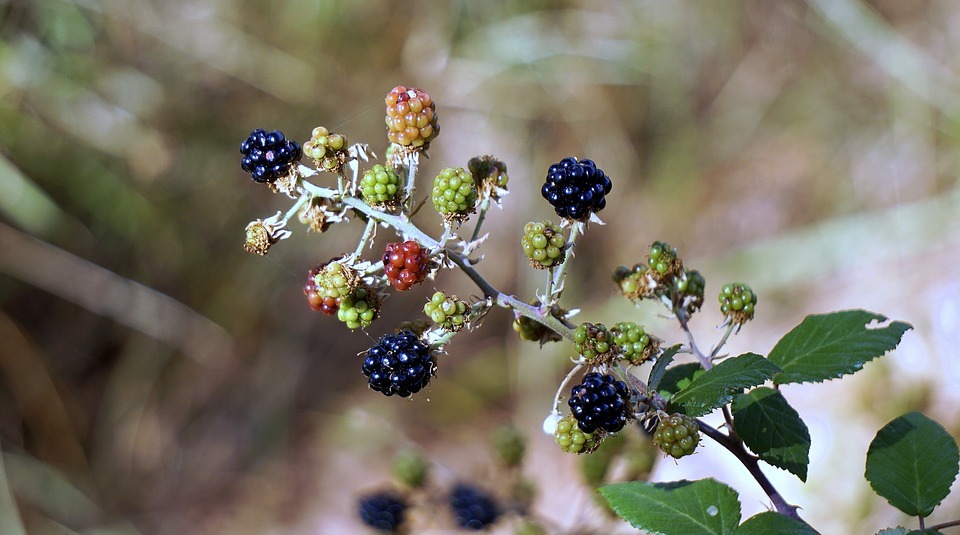This article explores the question of whether dogs can safely indulge in the deliciousness of blackberries. We’ll delve into the potential benefits and risks associated with feeding blackberries to your furry friend, providing a comprehensive guide for pet owners. We’ll discuss the nutritional value, potential dangers, and proper ways to incorporate blackberries into your dog’s diet. By the end, you’ll have a clear understanding of whether blackberries are a suitable treat for your canine companion.
Part 1: Blackberries and Dogs: A Nutritional Overview

1.1 Nutritional Content of Blackberries
Blackberries are a rich source of various vitamins, minerals, and antioxidants, making them a healthy addition to a balanced diet for humans. However, their nutritional profile for dogs can vary depending on the specific breed, size, and activity level of your canine.
- Vitamin C: A potent antioxidant that supports the immune system. This vitamin is crucial for collagen production, which helps maintain healthy skin, bones, and connective tissues.
- Vitamin K: Essential for blood clotting and bone health. Vitamin K plays a vital role in the coagulation process, helping to stop bleeding and prevent excessive blood loss.
- Manganese: Plays a role in bone formation and carbohydrate metabolism. Manganese is essential for bone growth and development, as well as the breakdown of carbohydrates for energy.
- Dietary Fibre: Aids digestion and promotes healthy bowel function. Dietary fibre helps regulate bowel movements, prevent constipation, and support a healthy gut microbiome.
- Antioxidants: Help protect cells from damage caused by free radicals. Antioxidants neutralize harmful free radicals that can damage cells and contribute to ageing and disease.
1.2 Benefits of Blackberries for Dogs
While blackberries aren't a staple in a dog's diet, they can offer some potential benefits:
- Improved Digestive Health: The high fibre content in blackberries can promote regular bowel movements and reduce constipation. This is particularly beneficial for dogs prone to digestive issues.
- Enhanced Immune Function: Vitamin C and antioxidants in blackberries contribute to a strong immune system, reducing susceptibility to illness. These nutrients help strengthen the body's natural defences against infections.
- Anti-Inflammatory Properties: Blackberries contain compounds that may help reduce inflammation in the body. This can be helpful for dogs with conditions like arthritis or allergies, where inflammation plays a significant role.
- Potential for Weight Management: Blackberries are relatively low in calories and high in fibre, making them a healthier treat option for overweight dogs. The fibre content promotes a feeling of fullness, while the low calorie count helps prevent excessive weight gain.
Part 2: Potential Risks of Blackberries for Dogs
![]()
2.1 Sugar Content
Blackberries contain natural sugars, which can be problematic for dogs with diabetes or those prone to weight gain. Excessive sugar intake can lead to:
- Weight Gain: Contributing to obesity and related health issues like joint problems, cardiovascular disease, and diabetes.
- Dental Problems: Sugar can contribute to plaque buildup and dental disease, leading to tooth decay and gum infections.
- Pancreatitis: In extreme cases, high sugar consumption may trigger pancreatitis, a serious inflammatory condition of the pancreas. This can be life-threatening if left untreated.
2.2 Seeds and Stems
Blackberry seeds and stems are indigestible and can pose a choking hazard, especially for smaller dogs. They may also cause:
- Gastrointestinal Upset: Seeds and stems can irritate the stomach and intestines, leading to vomiting or diarrhoea.
- Blockages: In rare cases, large quantities of seeds or stems can accumulate in the digestive tract and cause blockages, requiring veterinary intervention.
2.3 Pesticides and Herbicides
Blackberries grown commercially may be treated with pesticides and herbicides, which can be harmful to dogs if ingested. Always wash blackberries thoroughly before giving them to your dog.
2.4 Allergies
While rare, some dogs may be allergic to blackberries. If your dog exhibits symptoms like itching, swelling, or difficulty breathing after consuming blackberries, immediately seek veterinary attention.
Part 3: Feeding Blackberries to Your Dog Safely

3.1 Moderation is Key
Blackberries should be given as an occasional treat, not a regular part of your dog's diet. A few blackberries as a reward or a special treat are fine, but avoid overfeeding.
3.2 Choose Organic and Wash Thoroughly
To minimise the risk of pesticide exposure, choose organic blackberries whenever possible. Always wash them thoroughly before feeding them to your dog to remove any dirt or residue.
3.3 Remove Seeds and Stems
Before offering blackberries to your dog, remove the seeds and stems to prevent choking and digestive problems.
3.4 Introduce Gradually
If you're introducing blackberries to your dog for the first time, start with a small amount and monitor them closely for any adverse reactions. Gradually increase the amount over a few days to allow their digestive system to adjust.
3.5 Monitor for Reactions
After introducing blackberries to your dog for the first time, monitor them for any signs of adverse reactions such as vomiting, diarrhoea, or changes in appetite. If you notice any unusual symptoms, discontinue feeding blackberries and consult your vet.
Part 4: Alternatives to Blackberries
4.1 Other Fruits and Vegetables
There are various other fruits and vegetables that are safe and beneficial for dogs, including:
- Apples: (without seeds and core)
- Bananas: (in moderation)
- Blueberries: (a good source of antioxidants)
- Carrots: (a good source of vitamin A)
- Green beans: (a good source of fibre)
4.2 Commercial Dog Treats
There are numerous commercial dog treats available that are specifically formulated to be safe and nutritious for dogs. These often come in various flavours and textures to cater to your dog’s preferences.
Part 5: FAQs
5.1 Can puppies eat blackberries?
Puppies have more sensitive digestive systems than adult dogs. It's best to avoid giving blackberries to puppies until they are at least six months old.
5.2 Are blackberries poisonous to dogs?
Blackberries themselves are not poisonous to dogs. However, the seeds, stems, and potential presence of pesticides can pose risks.
5.3 How many blackberries can I give my dog?
The number of blackberries you can give your dog depends on their size and weight. A small dog might only need a few, while a larger dog might be able to handle a handful. It’s important to start with a small amount and observe your dog for any adverse reactions.
5.4 What if my dog eats blackberries with seeds and stems?
If your dog has eaten blackberries with seeds and stems, monitor them closely for any signs of digestive upset or choking. If you are concerned, contact your vet for advice.
5.5 Can I give my dog blackberry juice?
Blackberry juice is high in sugar, which is not good for dogs. Avoid giving your dog blackberry juice.
5.6 Can dogs eat blackberry leaves?
Blackberry leaves are not considered toxic to dogs, but they are not particularly nutritious either. It's best to stick to the berries themselves, ensuring they are washed and free of seeds and stems.
5.7 My dog has diabetes. Can they eat blackberries?
Dogs with diabetes should avoid blackberries due to their sugar content. If you have a diabetic dog, consult your vet for advice on suitable treats.
5.8 What are some other healthy alternatives for dog treats?
Besides fruits and vegetables, there are many other safe and healthy treat options for dogs. Some include:
- Cooked meat: Lean meats like chicken, turkey, and beef can be a good source of protein for dogs.
- Fish: Cooked fish, especially salmon, is rich in omega-3 fatty acids that are beneficial for a dog's coat and skin.
- Sweet potatoes: A good source of fibre and vitamin A.
- Pumpkin: A great source of fibre and can help with digestion.
Everyone is watching
-

Can Dogs Eat Bananas? A Guide to Safe Treats
DOGS & PUPPIESThis comprehensive guide will delve into the world of canine nutrition, focusing on the popular question: can ...
-

Can Dogs Eat Oranges? (Is It Safe or Toxic?)
DOGS & PUPPIESThis article delves into the question of whether dogs can safely consume oranges. We'll explore the nutrition...
-

Can Dogs Eat Grapes? The Shocking Truth About This Fruit
DOGS & PUPPIESThis article delves into the controversial topic of grapes and dogs, exploring the potential dangers associate...
-

Why Do Dogs Eat Poop? Understanding Coprophagia in Dogs
DOGS & PUPPIESThis article delves into the perplexing phenomenon of coprophagia, the act of eating faeces, in dogs. We explo...
-

Can Dogs Eat Shrimp? A Guide to Safety and Risks
DOGS & PUPPIESThis comprehensive guide dives into the world of shrimp and dogs, exploring the potential benefits and risks a...
